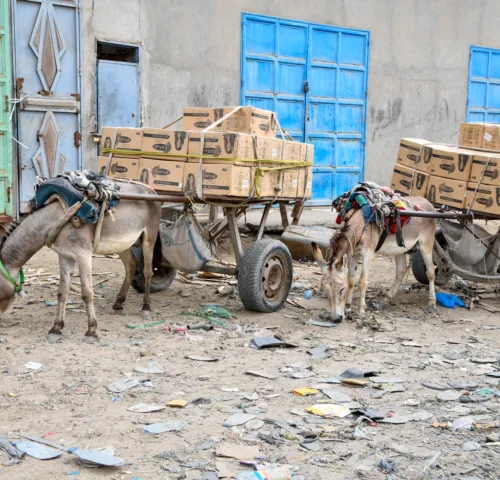Saving Maya after she had accidentally eaten plastic
Maya, a five-year-old donkey, ploughs fields for up to eight hours a day. She helps her owner Younes, a farmer, earn a small income in Belhijet, Tusinia, where temperatures last summer reached a staggering 48°C.
One day, Younes noticed Maya was unwell. Struggling to stand or open her eyes and with a noticeably bloated stomach, Younes was extremely worried. So, he took her to our SPANA centre in Kasserine.
Our vets immediately recognised the symptoms of colic. Maya was severely dehydrated, which was causing her sunken eyes, and her bloating suggested an intestinal blockage. The poor animal would have been in agonising pain.
The vets knew they had to act quickly. They performed an ultrasound, which showed a blockage that was stopping fluid from being absorbed into Maya’s system. Maya was given fluids to hydrate her, and anti-inflammatories to ease her pain. The vets also gave her paraffin oil to loosen the blockage, which eventually managed to pass through her system. Fortunately, through this treatment, Maya was able to avoid surgery.
After a week of careful monitoring, feeding and hydration, Maya returned to normal health. Her blockage had been caused by her accidentally swallowing a plastic bag.
Without treatment, her gut could have ruptured or twisted, cutting off her blood supply and she might have died.
Maya was lucky – many healthy working animals who ingest plastic end up in need of lifesaving surgery and those without access to treatment often don’t survive.
Your donation could help us save other working animals like Maya from the perils of eating plastic. Please, will you help us make sure that no animal needs to suffer the consequences of a deadly diet? Thank you.
The lives of working animals are at risk from eating plastic
Accidental plastic ingestion is a growing problem across many of the countries where we work. Long periods of drought mean fewer crops grow and rising feed costs mean many owners simply cannot afford to feed their animals.
Desperately hungry, these hardworking animals are often left to scavenge through bins and litter-strewn marketplaces looking for scraps to eat. In doing so, they unwittingly eat plastic which can get lodged in their intestines and lead to painful colic or a fatal gut rupture.
Sadly, this problem is not going to go away any time soon. Issues like the rising cost of living, drought and natural disasters like last year’s earthquake in Morocco mean that people are struggling to look after their animals. Displaced and abandoned animals have no choice but to trawl streets, roadsides and rubbish dumps for food, putting them at greater risk of eating foreign objects like plastic in an increasingly polluted world.
Will you please help us provide lifesaving treatment to animals suffering from plastic ingestion? Thank you so much.
Thank you
Your generous donations will be used for projects such as those featured in this plastics appeal and where they are required the most to help animals in need.


